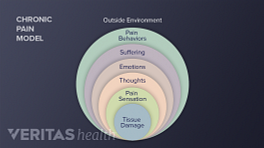Clinicians who specialize in treating chronic pain now recognize that it is not merely a sensation, like vision or touch, but rather chronic pain is strongly influenced by the ways in which the brain processes the pain signals.
See Understanding Chronic Pain
Chronic pain can provoke emotional reactions, such as fear or even terror, depending on what is believed about the pain signals. In other cases (such as in sports or another engaging, rewarding activity), chronic pain may be perceived by the individual as merely a nuisance, a feeling to be overcome in order to be able to continue in the activity.
The important role the mind plays in chronic pain is clearly recognized in medical literature, as well as in the International Association for the Study of Pain's definition of pain, which states that pain is always subjective and is defined by the person who experiences it.
The corollary is that the brain can also learn how to manage the sensation of pain. Using the mind to control chronic pain or developing coping strategies for managing persistent pain may be used alone or in tandem with other pain management therapies.
The use of chronic pain management techniques outlined in this article can help patients become less dependent on pain-relieving medication and feel more empowered to be able to control their pain.
Managing Chronic Pain
The first step in coping with chronic back pain or other types of persistent pain is to receive a thorough medical evaluation to determine the cause of the pain.
- In some situations, such as a herniated disc in the spine, it may be important to pay attention to the level and type of pain so that it can serve as a warning signal of impending damage.
- In other cases, especially when the back pain is chronic and the health condition is unchangeable, one goal can be to try and keep the pain from being the main focus of one's life.
Whatever the medical condition, there are a number of effective strategies for coping with chronic back pain. These techniques generally include one or more of the following:
- Relaxation training. Relaxation involves concentration and slow, deep breathing to release tension from muscles and relieve pain. Learning to relax takes practice, but relaxation training can focus attention away from pain and release tension from all muscles. To learn these skills, relaxation tapes are widely available.
- Biofeedback. This technique is taught by a professional who uses special machines to help control bodily functions, such as heart rate and muscle tension. Biofeedback can be used to reinforce relaxation training. Once the technique is mastered, it can be practiced without the use of the machine.
- Visual imagery and distraction. Imagery involves concentrating on mental pictures of pleasant scenes or events or mentally repeating positive words or phrases to reduce pain. Distraction techniques focus attention away from negative or painful images to positive mental thoughts. This technique may include simple activities, such as watching television or a favorite movie, reading a book or listening to a book on tape, listening to music, or talking to a friend.
- Hypnosis. This technique can be used in two ways to reduce the perception of pain. Some people are hypnotized by a therapist and given a post-hypnotic suggestion that reduces the pain they feel. Others are taught self-hypnosis and can hypnotize themselves when pain interrupts their ability to function. Self-hypnosis is a form of relaxation training.
In This Article:
- Chronic Pain Coping Techniques - Pain Management
- 11 Chronic Pain Control Techniques
- Treatment for Chronic Lower Back Pain Video
Skills to Manage Chronic Pain
All of the above-describe techniques for coping with chronic back pain make use of four types of skills:
- Relaxation of the deep muscles
- Distraction or moving attention away from the pain signals
- Concentration and focus on images, sounds or other thoughts that provide a pleasant and relaxing experience
- Dissociation, the ability to separate normally connected mental processes, leading to feelings of detachment and distance from the chronic pain
Based on the underlying cause, doctors and/or therapists may use a combination of techniques to manage chronic pain. If the pain persists, worsens, or impacts daily activities, other medical treatments may be considered.









